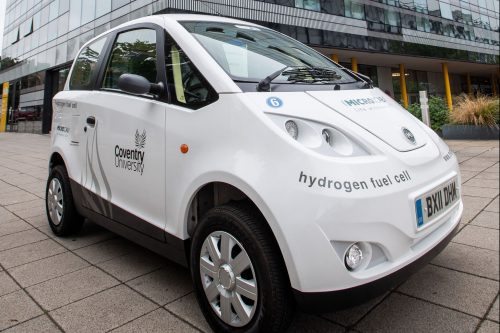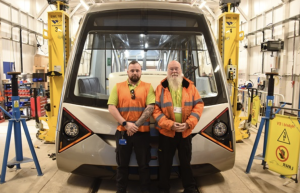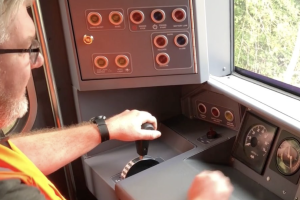Hydrogen fuel cell powered cars driven by Coventry Uni spin-out

Coventry University spin-out Microcab will be giving a preview of its new hydrogen fuel cell-powered car at an EU backed event in Coventry this week, which is designed to showcase this new technology, and which has been described as a “coup for the West Midlands”.
The European Commission funded a four year trial, the SWARM project, has put dozens of fuel cell vehicles onto the road in the West Midlands and other parts of Europe. Microcab collaborated with German automotive giant MAHLE in the project alongside fuel cell cars from Toyota and Riversimple.
Hydrogen fuel cell-powered cars have a range to match a conventional engine and are able to fill up in seconds. They combine hydrogen from the pump, with oxygen from the air to create electricity, which drives the vehicles’ electric motors, and water (the only substance the car emits) in a reverse electrolysis reaction.
John Jostins, Microcab’s managing director and professor of sustainable design at Coventry University’s Institute for Future Transport and Cities, said: “Battery electric power tends to dominate discussion around zero emission vehicles, but hydrogen fuel cells will be the defining technology of the 21st century. This is not about having a VHS versus Betamax debate about which technology will prevail, but more about how the two will work together.”
Prof Jostins is a pioneer of innovation – he was one of the team that built the advanced version of the robotic droid R2-D2 for Star Wars episodes V and VI in the 1980s.
“It is a coup for the West Midlands to be hosting this event showcasing how far hydrogen fuel cell technology has come – quite a flag in the sand moment for our region which demonstrates how we are very much at the forefront of low carbon developments.”
“The aim is to boost the profile of hydrogen as an alternative fuel of the future. It does not come without its challenges, but it is the most abundant element in the universe and its efforts and investment are focused towards infrastructure to harness its potential, it could become the planet’s preeminent energy source.”
The Department of Transport has pledged to spend over £30m extending the number of refuelling stations for hydrogen-powered vehicles in the UK. Currently there are only two, at Coventry and Birmingham Universities








